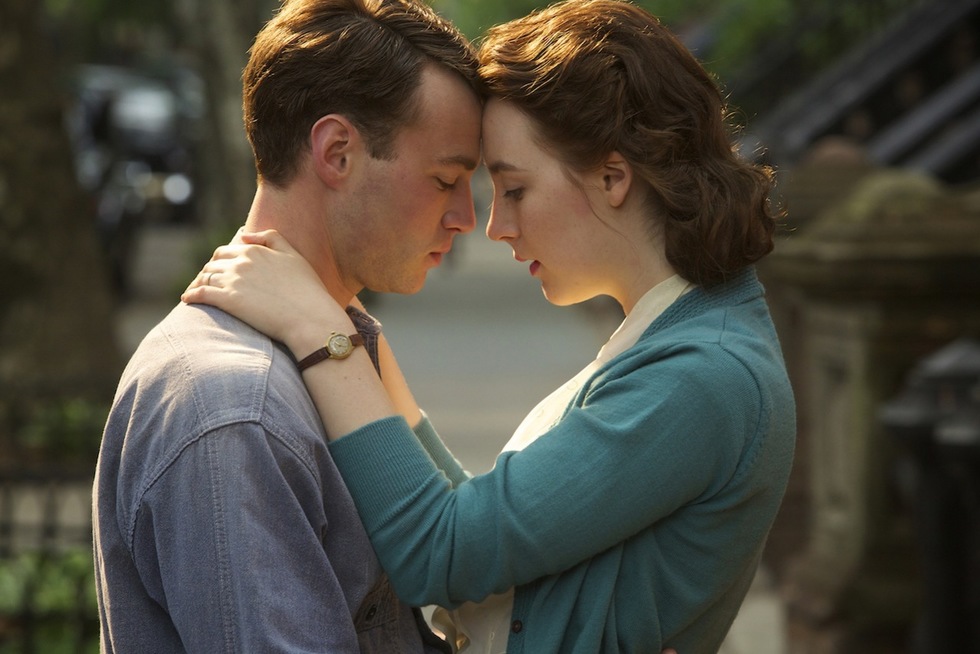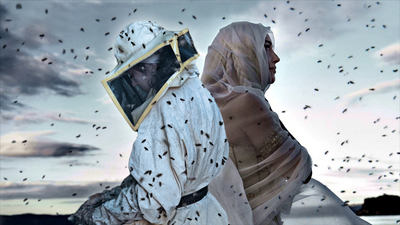
BY MATT BARONE |
American Dreamer: How BROOKLYN Offers a Fresh, Much-Needed Perspective on Immigration
Although it's set in the 1950s, BROOKLYN speaks directly to today's emigration issues. In the following Q&A, director John Crowley explains why.

As America gears up for the next presidential election, immigration is at the front of everyone's minds. For the filmmaking community specifically, it's evolved into a must-address topic thanks to the ever-polarizing Donald Trump, whose recent comments about Mexicans. To refresh your memory, here's the garbage that poured from The Donald's mouth this past summer: "When Mexico sends its people, they're not sending their best. They're sending people that have lots of problems, and they’re bringing those problems with us. They're bringing drugs. They're bringing crime. They’re rapists. And some, I assume, are good people."
Understandably, Latin filmmakers and actors like Alejandro González Iñárritu and Diego Luna have joined the anti-Trump movement, yet the most vocal Hollywood type has been Zoe Saldana, who opened up to Latina. "This topic of immigration hurts because I don’t want to be angry anymore," Saldana said. “I'm kind of embarrassed when you see all of these people talking on national television, and it's like, 'Oh my God, if your grandfather were alive today, when he came here from Ireland, from Italy, escaped fucking war in Russia. You're rotting his name to shame. It doesn't matter how much money you have, or how many degrees from Ivy League schools. You're such a bigot. You're such a hick right now.' People have to be open to the reality of what's happening in our country."
The conversation has also stretched beyond Trump. Artist/filmmaker JR's new short film, Ellis, is currently touring the country with free community-arranged screenings; in it, Robert De Niro plays a ghost reflecting on all of those who passed through Ellis Island on the hunt for the "American dream" while haunting the island's grounds. And now there's Brooklyn, the beautiful new film from Irish director John Crowley (Boy A, 2007).

Based on author Colm Tóibín's acclaimed 2009 novel of the same name, and set in 1951, Brooklyn stars Saoirse Ronan as Eilis Lacey, a teenager in Ireland who’s sent to live in America by her older sister (Fiona Glascott) to find better opportunities and leave their native’s lands humble confines. In Brooklyn, after an overwhelming bout of homesickness, Eilis meets and falls for Tony (Emory Cohen), a kind-hearted Italian boy. Their relationship is tested when a tragedy back home sends Eilis back to Ireland, where, now having matured greatly in America, her newfound confidence leads to a stronger sense of place and a budding romance with Jim (Domnhall Gleeson).
Anchored by Ronan's amazing performance, Brooklyn digs deeper into the difficulties of immigration than most, if not all, previous films about the subject. Once she’s back in Ireland, Eilis feels strangely alien, despite the fact that her friends and family members suddenly view formerly frumpy young woman in a more glamorous light. Crowley's film examines the complexities of leaving home, becoming a different person, and then having to go back to that now-somewhat-foreign home as a kind of outsider. It's an unavoidable and often devastating truth about immigration and emigration that's always left out of the political conversations about the issue, the ones spearheaded by the close-minded Donald Trump's of the world.
Here, TribecaFilm.com chats with John Crowley about Brooklyn's unique and very necessary handling of the immigrant experience.
Most films about immigrants are fish-out-of-water stories, where the immigrant characters tries to find their place in America, and that's the whole film. Brooklyn is the first film I've ever seen that shows how the fish out of water in America then also becomes a fish out of water in his or her own native country. Was that the story's big hook for you?
Absolutely. That's what Colm nailed in his novel. That's what made me feel that this is a really important story to tell. It's not just about Ireland. It's a film about exile. When someone leaves their homeland to go to a new country, they’re obviously not from the new country, but their relationship with their homeland has shifted both fundamentally and terminally. It's forever. When you go back, you go back having had a set of experiences that distances you from that country; even if they're positive experiences, what you’ve turned into is something that will be viewed differently back home. And it’s not necessarily a negative view. When Eilis goes back home to Ireland, there's actually a touch of a film star about her—she's quite glamorous. But they start looking at her in ways that they hadn’t looked at her before.
That brings about a feeling of, you're not from either place. It's very reassuring for Eilis to be back home, but it's also equally confusing, because she misses things about America, in a way. There's a double-ness to that, and a sense that a split opens up in somebody, which never heals or goes away—you just have to choose who you're going to live with in your life, and you get on with it. That feels radical to me; it feels like a very different take on a story that feels like we know it. Nobody's ever told a story that takes an immigrant to America and then sends her back home, to really see what the effects of immigration. And then, of course, the fact that it's also a "her" instead of a "him." The fact that it's from the point-of-view of a young woman gives the material a very different kind of freshness.
Would you say it's something specific to emigrating to America that lends the experience a kind of glamour in the eyes of the people back home?
I do, and what we tried to do in the film is not give one simplistic, positive vision of emigrating to America. We tried to play with different versions of that. The myth, especially with Ireland, that you can leave the country and within a few generations, one of your grandchildren could become the President of the United States has a very strong hold of the Irish imagination because of the Kennedy's, right? America still does represent the land of opportunity to Irish people in a way that England never has.
In terms of how we handle that in the film, there's the shot where you see Eilis clear the immigration hall and walk through the door and the light from the other side is glowing and almost heavenly. There's the sense that she's crossed the threshold into something very new, and exciting, and positive for herself. Ten minutes later, another door opens and in walks this silent chorus of old men into the soup kitchen on Christmas Day; in that moment, Eilis sees that she's part of something that’s much, much bigger and isn’t necessarily positive. She's feeling very homesick through that period, but the other side of immigration is the guys who built the roads, the tunnels, and worked all of their life but in the end are left with very little. They didn't necessarily get a great deal out of the "American dream" and that's stitched into the film.

It's not about criticizing or bigging up America—it's about something very particular in the Irish mind, as well as in the world’s eyes in a lot of ways. When Eilis goes back to Ireland, she’s kind of living in a dream life—it's not quite her life. She's in her sister's old job, it's so reassuring to be back home. It’s lovely to see her mother and her friends, and it's lovely to appreciate the emptiness of an Irish beach, having been to Coney Island back in New York. But when she has that scene with the mean old shopkeeper, it crystallizes that she can no longer squelch herself into a box in this small town. The shopkeeper has this petty invasiveness of a self-appointed moral guardian, and Eilis realizes that she's unable to be a part of that small-town thing anymore. That's the final arrival of herself into herself.
It's the sense that you leave a country and then pulled back into an idea of the life you had before. What the film suggests is that you'll be haunted by the "What if?" of the other life, the other existence, which will kind of walk beside you as you live the current life.
There's that great scene between Eilis and her mother back in Ireland, near the end of the film, where she's essentially saying goodbye to her mother forever. It captures a sense of guilt that most immigrant stories overlook as they focus so much on the one-sided allure of heading to America.
That's part of what I'm saying. We allowed the complication of her relationship to the idea of emigration to enter the story. You can do that really well in a novel because you have so many more opportunities to walk around the inside of someone's head and work through their interior, but if you try to do that in as much detail in a film, there's the potential to muddy everything. At the beginning, Eilis doesn't want to go because she’s scared of leaving her sister and her mother behind. She's scared, in general, because she doesn't know what she's heading into. And it's not even her decision at first. The decision is made for her at the start of the film by the priest and by her sister. It's an act of generosity to get her out of Ireland and rescue her on some level.
And then it becomes very complicated. When her sister dies, the level of obligation she feels towards having to be back home is strong, and ultimately, that's a version of what anybody feels in their life. It’s about those ties that can hold onto someone and pull you in a direction that may suit you or it may not work for your life. Everyone has to figure that out in their own way—there’s no one right answer or approach to that conflict. At the end of the scene with Eilis' mom, which is rather devastating, she realizes that she may never see her mom again, and there's a level of awfulness to that. But her mom isn't a baddie. There's the heartbreaking line after the mom hears about Eilis' new husband; you can see the mom's heart breaking, over not knowing about her daughter's marriage, and she says, "Is he nice? He'd have to be nice if you married him."
On every level, we tried not to be simplistic, because the story itself is actually very simple. But the idea behind the film has a big scale to it, and the specific relationships with everybody are very complicated.

The film handles those complexities so subtly. While watching Brooklyn, it didn't dawn on me that Eilis has undergone such a huge transformation and maturation in New York until she returns to Ireland and all of her friends and loved ones point that out to her. The film's subtlety helps the viewer come to that realization just as Eilis does herself.
We're looking at the development of a young woman who's quite passive at the start of the film, and almost mousy. Nobody takes notice of her, especially not the rugby guys, because she’s not one of the quote-unquote "pretty" girls. She gradually goes through the rather painful process of creating this young woman, through the kindness of strangers and these other young women who are those quote-unquote "pretty" girls helping her in the new Brooklyn world.
This gradual bit-by-bit growth of the character happens but you shouldn’t notice it until a few key marker moments. The first marker moment is when she returns to Ireland and everyone tells her how glamorous she looks. That's an indicator of how far she’s come in that period, and because we see her through the eyes of her homeland, we see that the incremental steps of her development have added up to something very significant.
The other marker comes in the film's penultimate scene, when Eilis is on the ship's deck, returning back to America. She's standing next to that young, scared Irish girl. She starts giving the girl the advice that was passed onto her months ago when she was an innocent, young, pasty-faced girl on her way to America without a clue. You see that she’s turned into a version of the girl she met on the boat months ago. She's older, wiser, probably a bit sadder, and totally in control of her own life, but not without a significant cost. You realize that she's grown into this wonderful young woman because of everything she's experienced.
So much so that you're with her no matter which life or guy she chooses. You know that whichever choice she makes will be the right one for her. You trust that she's going to be okay.
Exactly. What we tried to land in this film is that being "okay" doesn't necessarily mean "happily ever after," and it doesn't mean that life’s easy. Life is massively complicated. It's a film without a villain. The human heart is complicated enough without gunshots, explosions, and car chases. [Laughs.] With nothing more than a very simple story, you can hopefully build up an emotional arc where an audience really invests in that journey, and wants her to be okay, but without the cheap reassurance of a "happily ever after."

If she's choosing to go with Tony, she's making an adult choice not to have all of these other things in her life. If you choose one path, it means that another is shut down, and that can cost you. Hopefully all of that makes this film feel grown-up. It's a rite-of-passage film. It's showing you what it means to grow up and be a little bit wiser and a little bit sadder, but now sadder in a depressed way. It's in a way of, "Well, at least you're more in control of your choices now."
Brooklyn taps into a much larger discussion that's happening in America these days about immigration and immigration reform. It's a hot topic among presidential candidates and for President Obama, and there are countless reports where it's all about policies, numbers, charts, and other stat-based things, but never about the actual people at the heart of the matter. Brooklyn shows the human side of immigration exceptionally well. The timing couldn’t be better.
Immigration is also really hot topic right now in the United Kingdom, which is where I live, and it isn’t always a very positive hot topic. The discourse around it can be very sour, to put it mildly. You're right, when politicians get up on their grandstands and start shouting about these things, they do tend to treat migrants as, I think [Prime Minister of the United Kingdom] David Cameron's phrase was "swarms" of them, as if they're just this faceless mass of people.
The film doesn't have an overtly political agenda, but it does have a political agenda with a lower-case "p," which is to say it has a humanizing agenda. If you watch this one tiny story about a young girl in the '50s who emigrates and nothing terribly awful happens to her in her new country, and if you’re moved by what it feels like to just be awfully homesick, in a sense you humanize something. You're saying, "Okay, this is one tiny story—you do the rest yourselves."
My intention was never to make a period piece. The point was to make something that would be a very vivid and immediate emotional experience for the viewer. In turn, that could hopefully create a distance to allow the viewer to see something that’s still happening today more clearly.

